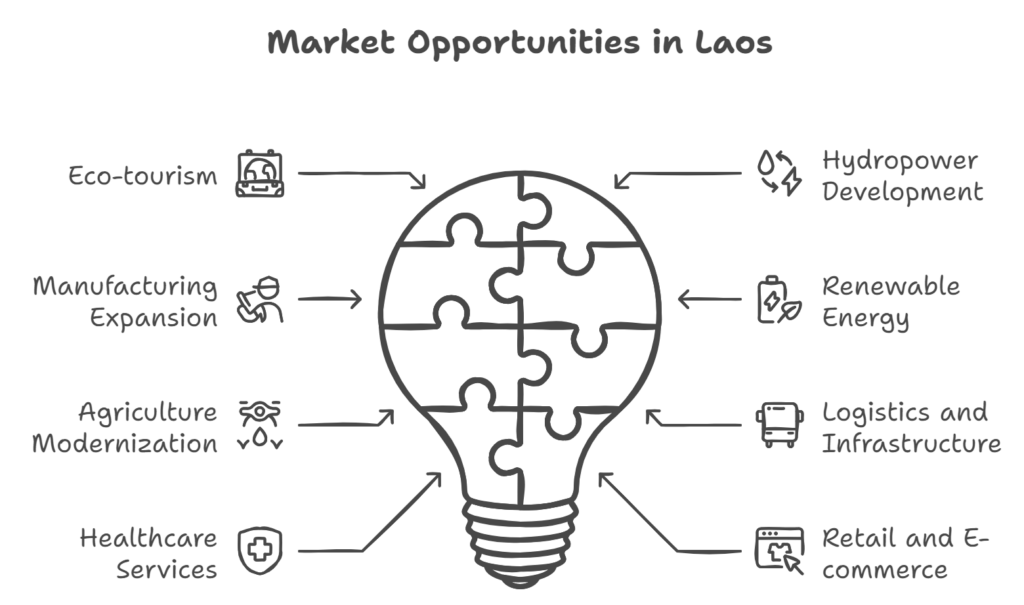Market Research in Laos
With Laos’ economy transitioning from agriculture to more diverse sectors like manufacturing and tourism, businesses need to stay informed about market dynamics.
How can your business thrive in Laos, a country experiencing significant economic transformation? The answer lies in market research in Laos, which provides critical data on market trends, consumer preferences, and business challenges. With this information, companies can make informed decisions that lead to long-term success.
What Is Market Research in Laos?
Market research in Laos helps businesses make informed decisions about how to position themselves for success in this country. In Laos, market research addresses specific challenges such as understanding a population that is primarily rural and less digitized than its neighboring countries. Businesses need accurate data to navigate logistical challenges and adapt their offerings to local consumer needs. Conducting market research in Laos allows companies to stay ahead of emerging trends and capitalize on the growing sectors that are driving the country’s economic growth.
Why Do Businesses Need Market Research in Laos?
One of the main reasons businesses require market research in Laos is to understand consumer behavior in a predominantly rural country. With a majority of the population living in remote areas, distribution and logistics can be complex, and businesses need to plan accordingly. Market research helps companies determine the best ways to reach these consumers, as well as the most effective products and services to offer.
Laos’ regulatory landscape is also evolving, with new laws and policies being introduced as the country opens up to more international trade and investment — and market research allows businesses to stay updated on these regulatory changes, ensuring compliance and identifying potential advantages, such as government incentives for specific industries like tourism and renewable energy.

Cities and Economic Centers
Tourism is one of the fastest-growing industries in Laos. Chinese, Thai, and Vietnamese tourists are the main visitors to this land-locked country.
Vientiane is the laidback and comfortable capital of Laos. With temples, government buildings, hotels, and more, Laos is attractive to tourists. It’s the perfect place for a peaceful and culture-rich experience. In Vientiane, visitors can find large Western-style homes on campus. Known to the locals as Panyathip, these homes cater to the foreign market.
Luang Prabang is a city full of natural and cultural attractions. The monks’ daily ritual of collecting donations is quite an event. Tourists and locals alike take part in this ritual. Biking is a standard mode of transport amongst visitors. Luang Prabang also has charming and historic rivers, waterfalls, and caves.
Opportunities in Market Research in Laos
Laos offers numerous opportunities for businesses across various sectors, and market research is essential for identifying and capitalizing on these opportunities. Here are 10 key areas where businesses can find growth potential:

- Eco-tourism: Laos is becoming a prime destination for eco-tourism, which focuses on sustainable travel and the preservation of natural resources.
- Hydropower Development: With abundant rivers, Laos is a regional leader in hydropower, offering opportunities in energy production and infrastructure projects.
- Manufacturing Expansion: As Laos transitions from an agricultural economy, manufacturing in textiles, electronics, and other goods is gaining traction.
- Renewable Energy: Beyond hydropower, there is potential for solar and wind energy projects as Laos seeks to diversify its energy portfolio.
- Agriculture Modernization: Opportunities exist to upgrade agricultural practices, such as introducing technology for improved yields and exports.
- Logistics and Infrastructure: With growing investment in infrastructure, businesses can contribute to and benefit from improvements in transport and logistics networks.
- Healthcare Services: As the population becomes more urbanized, there is a growing demand for healthcare facilities and services.
- Retail and E-commerce: As digital infrastructure improves, the retail and e-commerce sectors are set to grow, especially in urban areas.
- Education and Training: There is a demand for educational services, particularly in vocational training and specialized skills development.
- Luxury Tourism: Laos is an emerging destination for high-end travelers seeking unique, off-the-beaten-path experiences, creating opportunities for luxury hotels and travel services.
Challenges in Market Research in Laos
While there are numerous opportunities, businesses must also be aware of the challenges in Laos. Market research in Laos helps businesses identify these challenges and create strategies to overcome them.
- Geographic Barriers: Laos is a landlocked country with mountainous terrain, making transportation and logistics challenging, particularly in rural areas.
- Limited Infrastructure: Outside of major cities, infrastructure for roads, electricity, and internet remains underdeveloped, complicating business operations.
- Small Consumer Base: With a population of just over 7 million, the market size is relatively small, limiting the potential for large-scale operations.
- Rural Dominance: A large proportion of the population lives in rural areas, making it difficult for businesses to access these consumers efficiently.
- Regulatory Uncertainty: Navigating the evolving regulatory landscape can be challenging, especially for foreign businesses unfamiliar with local laws.
- Corruption: Businesses may encounter corruption in certain sectors, making it difficult to operate transparently and efficiently.
- Currency Instability: Fluctuations in the value of the Lao kip can make financial planning difficult, especially for companies involved in international trade.
- Low Digital Adoption: Laos lags behind its neighbors in digital infrastructure, making it challenging to implement digital solutions or e-commerce initiatives.
- Talent Shortage: There is a limited pool of skilled labor, particularly in specialized industries like technology, manufacturing, and renewable energy.
- Economic Dependency: Laos is heavily reliant on neighboring countries for trade, making its economy vulnerable to external factors and fluctuations in regional markets.
Growing Consumer Market

A new interest in organic products has taken root in some Laos consumer’s minds. Still, consumers aren’t willing to commit to the concept of organic products. That’s due to the price difference between organic and standard products. Consumers with higher education levels are willing to sacrifice price for health, however. They’re showing that interest in organic food can become widespread with time.
With a growing middle class, more consumers can afford more than only necessities. Laotian consumers have shown that advertising can influence them. They respond to advertising through celebrities, word of mouth, and television.
Laotian consumers prefer to shop in their neighboring countries like Thailand. Most of these shoppers are looking for better quality goods and facilities. Younger consumers are also seeking higher standards for their shopping areas. Another goal of shopping in neighboring countries is to socialize with peers.
Recreational shopping is popular in Thailand. Yet ordinary Laotians prefer to shop in their homeland markets, where most people buy produce and textiles.
Business Climate
Laos has the lowest taxes in East Asia. This strategy is to attract foreign business and investments. Corporate income taxes, progressive income taxes, and VAT (value-added tax) are low. These tax incentives appeal to local and foreign companies.
The country’s new-found development and strategic location present a significant opportunity. Investments are rolling into Laos at a high rate. The government has many SEZs (specific economic zones), contributing a considerable amount to Laos’ boosted economic growth. Companies like Nikon and Toyota have factories in Laos’ SEZs. The draw for them was the agreeable laws and low taxes.
Laos’ SEZs are also helpful to locals. They generate jobs and lower the country’s already low unemployment rate.
How SIS International’s Market Research in Laos Helps Businesses
With our extensive expertise and localized approach, SIS International provides businesses with critical insights that help them navigate challenges and seize opportunities. Our market research in Laos is designed to support strategic decision-making, ensuring businesses can operate effectively and sustainably.
Enhanced Strategic Planning: SIS International’s market research in Laos provides businesses with detailed analyses of consumer trends, economic conditions, and market opportunities, enabling companies to plan strategically and align their operations with local realities.
Increased Revenue: By understanding consumer preferences and emerging sectors such as eco-tourism and renewable energy, businesses can tailor their products and services to meet local demand, driving revenue growth.
Risk Reduction: SIS helps businesses identify and mitigate risks related to regulatory changes, economic shifts, and logistical challenges, ensuring smooth market entry and sustained operations in Laos.
Improved Marketing Efficiency: SIS International’s insights enable businesses to refine their marketing strategies, focusing on the most effective channels and messages to reach their target audience efficiently and cost-effectively.
Accelerated Growth and Innovation: By identifying growth areas such as sustainable agriculture and hydropower, SIS International helps businesses innovate and expand faster in Laos’ evolving economy.
Boosted ROI: With data-driven decision-making and in-depth market insights, businesses can optimize their investments, maximizing their return on investment while ensuring long-term growth in Laos.
About SIS International
SIS International offers Quantitative, Qualitative, and Strategy Research. We provide data, tools, strategies, reports, and insights for decision-making. We also conduct interviews, surveys, focus groups, and other Market Research methods and approaches. Contact us for your next Market Research project.



